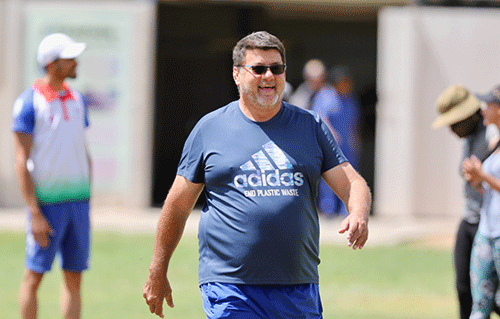Award-winning athletics coach Henk Botha has stressed the importance of gathering relevant information before making a decision regarding adjusting his athlete’s testosterone levels.
The coach of Namibia’s Olympic silver medalist Christine Mboma’s comments come in response to the recent ruling by Europe’s top human rights court in favour of Olympic runner Caster Semenya.
The court stated that Swiss courts should provide Semenya with a new opportunity to challenge the requirement for female athletes with high, natural testosterone to take medication to lower their levels.
Semenya, a South African double Olympic 800m champion, took her case to the European Court of Human Rights in February 2021 after unsuccessful appeals to the Court of Arbitration for Sport (CAS) and the Swiss Federal Tribunal (SFT) throughout a protracted legal battle.
The ECHR’s ruling, with a slim majority of four votes to three, concluded that Semenya’s initial appeal against World Athletics regulations had not received a proper hearing.
This ruling opens the door for athletes to challenge the regulations imposed upon them.
However, World Athletics maintains that the rules will remain in place.
A representative of the organisation stated, “We continue to believe the DSD regulations are a necessary, reasonable and proportionate means of protecting fair competition in the female category as confirmed by the Court of Arbitration for Sport and the Swiss Federal Tribunal after a thorough examination of the evidence”.
These regulations, which have put Semenya’s career on hold, also impact Mboma and fellow Namibian Olympian Beatrice Masilingi, both of whom have been barred from participating in any World Athletic-sanctioned competitions since the announcement earlier this year that athletes with high testosterone levels would need to reduce them in order to continue competing.
Botha, on behalf of Mboma, said they would first gather all the necessary information before making a decision.
“We need to thoroughly assess all the information surrounding this matter before determining our course of action. Only then can we make an informed decision moving forward,” he told New Era Sport.
In May this year, Botha told this publication that since starting medication to lower her testosterone levels, Mboma has not experienced any negative effects on her body.
At the time, he said they are planning to wait for the six-month period to end before she returns to the tracks to run.
Mboma, Masilingi and several other athletes, including Semenya, fell victim to the new rule that was announced by World Athletics in March this year that athletes with Differences in Sexual Development will be ineligible to compete in any international competition unless they take hormone therapy to reduce their “higher than average” levels of testosterone.
This medication should be taken for six months before they can return to competitive running.
Meanwhile, Abner Xoagub, president of the Namibia National Olympic Committee, downplayed the impact of the ruling, noting that it merely grants Semenya the right to challenge the Court of Arbitration for Sport’s decision, which was deemed unfair.
“I haven’t fully familiarised myself with the ongoing situation, as I haven’t had the opportunity to hear or read World Athletics’ statement. However, upon careful reading, the decision allows her to contest the previous ruling, but it does not guarantee her immediate return to competing in the 800m or signal a change in the existing rule. I will ensure I am well-informed before offering any further comments.”
– mkambukwe@nepc.com.na


